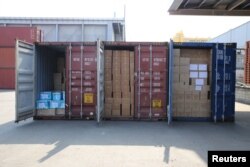Recent international sanctions intended to curb North Korea’s nuclear weapons program are hobbling humanitarian and relief efforts to safeguard the lives of millions in need, according to many aid workers.
With North Korea remaining steadfast in developing nuclear arsenals, the United Nations Security Council (UNSC) along with the United States and its allies, has put in place sweeping sanctions to thwart its nuclear development.
The sanctions – in particular, those under Resolution 2270 and 2321 adopted in March and November 2016, respectively – aim at cutting off money for the regime’s nuclear and military activities, calling on member states to limit North Korean financial transactions and withhold any type of foreign assistance, unless intended solely for humanitarian purposes.
“Measures imposed by this resolution are not intended to have adverse humanitarian consequences for the civilian population of the DPRK,” states Resolution 2321.
Sweeping sanctions
A number of international organizations and NGOs, however, say the sanctions pose significant impediments when carrying out their activities in the communist state, which still needs assistance despite continuing humanitarian efforts by the international community.
The U.N. Office for the Coordination of Humanitarian Affairs recently designated North Korea as a forgotten crises, with about 60 percent of the population being considered as food insecure and 1.7 million children being at risk of deadly childhood diseases.
Donna Porstner, associate director of media relations at Americares, told VOA the disaster relief agency was unable to provide assistance to North Korea in 2016, due to delays caused by new export licensing requirements, which were introduced by U.N. sanctions last year. Porstner said new internal procedures were implemented at the U.S.-based group to ensure compliance with all applicable export control rules.
“New sanctions introduced in early 2016 now require Americares to apply for an export license from the U.S. Department of Commerce’s Bureau of Industry and Security before shipping medical supplies and consumables to North Korea,” she said.
The head of the U.N. Central Emergency Response Fund (CERF), the United Nations humanitarian arm, echoed Porstner’s concerns, saying the restrictions are “too time consuming.”
“As a result of the sanctions, additional documentation is required to support the applications of permits and licenses which vary from country to country,” said Lisa Doughten, chief of the U.N.'s CERF secretariat. “End-user certification, especially for the dual-use items, raised concerns and complicated the handover of equipment and supplies to the government or at the end of the project cycle.” Dual-use items are those which could be used in weapons building.
Aid work crippled
According to Doughten, international suppliers – mostly in China – have increasingly become worried about being at risk of violating the sanctions.
“The very few suppliers willing to participate will often ask for a premium fee to cover the additional administrative legal procedures involved in export processes,” Doughten said. “Ultimately these additional requirements mean that the funds available to assist the beneficiaries are reduced as the operating costs are much higher.”
An official from a U.S.-based charity with experience in providing humanitarian assistance to North Korea said transferring money to suppliers also has become difficult as “Chinese banks are getting more risk-averse on sending and even receiving money that will be used in DPRK.”
Banks, many of them Chinese, are wary of running afoul of the sanctions for fear of losing access to the international financial system.
“So it's gotten more complicated and I think it will continue to get more difficult to, for example, procure things in China, just in terms of the funds transfer,” said the official who asked to remain anonymous, as did others who spoke with VOA, due to the sensitivity of the issue.
As Chinese banks in the China-North Korea border regions have become reluctant to make North Korea-related financial or commercial transactions, a growing number of Chinese suppliers are switching accounts to banks in Hong Kong or Shanghai, said another aid worker from an international relief agency, who has spent more than 20 years providing humanitarian aid to the impoverished country.
“We had a problem when we procured the CGI [corrugated galvanized iron] sheets for the emergency relief, where the supplier had to change the account to an offshore account,” said the worker, who also preferred to remain anonymous. “It seems that some banks are just very cautious.”
A typhoon that hit North Korea in August 2016 left tens of thousands homeless.
Nuclear tension blamed for impediment
Some experts acknowledge that the sanctions seem to present limitations on aid work and bring unintended consequences for the North Korean people, but said the current problem is likely to persist unless the Kim Jong Un government alters its nuclear policy.
“By the nature of sanctions, you will in fact hurt other people who you didn't intend to,” said Andrew Natsios, former administrator of the U.S. Agency for International Development and former vice president of World Vision U.S. “And my view is that the biggest problem is not the sanctions regime itself, it's the North Korean government.”
Natsios, who is now a professor at the George H.W. Bush School of Government at Texas A & M University, said if North Korean leadership “cared about its own people, it would be trying to go through economic reforms that would produce more food and more medical care for its people and that’s not what they are doing.”
Marcus Noland, director of studies at the Washington-based Peterson Institute for International Economics, whose areas of expertise include the North Korean economy, said increased international pressure is “the culmination of years of frustration with North Korean behavior.”
“I think that the international community has simply reached a point where rather than saying well, under certain circumstances, financial transactions with North Korea …they basically said financial transactions are not allowed and if you really have some humanitarian need, you need to demonstrate that in advance,” the economist said.
(Jenny Lee contributed to this report.)





